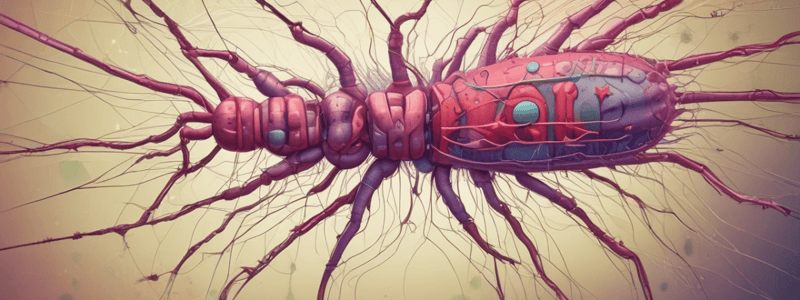Podcast
Questions and Answers
Which of the following is NOT a typical causative agent of meningitis?
Which of the following is NOT a typical causative agent of meningitis?
- Streptococcus pneumoniae
- Clostridium botulinum (correct)
- Listeria monocytogenes
- Neisseria meningitidis
What is a common effect of tetanus on the nervous system?
What is a common effect of tetanus on the nervous system?
- Muscle spasms and stiffness (correct)
- Permanently impaired speech
- Visual hallucinations
- Generalized muscle weakness
Which of the following treatments is commonly used for rabies once symptoms appear?
Which of the following treatments is commonly used for rabies once symptoms appear?
- Antiviral medication
- Immediate vaccination
- Antibiotics
- Supportive care only (correct)
Which statement about botulism is incorrect?
Which statement about botulism is incorrect?
How can toxoplasmosis lead to congenital defects?
How can toxoplasmosis lead to congenital defects?
Flashcards are hidden until you start studying
Study Notes
Bacterial Nervous System Infections
- Three major bacterial infections:
- Meningitis - caused by Neisseria meningitidis, Streptococcus pneumoniae, or Listeria monocytogenes; symptoms include fever, headache, and stiff neck; treated with antibiotics.
- Brain Abscesses - often caused by Staphylococcus aureus or Streptococcus spp.; signs include localized headaches and neurological deficits; treatment involves antibiotics and possible surgical drainage.
- Neuroborreliosis (Lyme Disease) - caused by Borrelia burgdorferi; symptoms include neurological changes; treated with antibiotics.
Effects of Botulism and Tetanus
-
Botulism Effects:
- Muscle paralysis, starting from facial muscles and moving downward.
- Difficulty swallowing and speaking.
- Respiratory failure due to paralysis of respiratory muscles.
- Reduced gastrointestinal motility leading to constipation.
- Flaccid paralysis can be fatal if untreated.
-
Tetanus Effects:
- Muscle stiffness and spasms, especially in the jaw (lockjaw).
- Generalized muscle rigidity, leading to opisthotonos (arch backward).
- Severe pain during muscle contractions.
- Respiratory distress due to diaphragm involvement.
- Autonomic dysfunction resulting in abnormal heart rhythms.
Bacteria Causing Meningitis
- Neisseria meningitidis
- Streptococcus pneumoniae
- Haemophilus influenzae
Worldwide Significance of Malaria
- Malaria is a major global health threat, primarily affecting tropical regions.
- Caused by Plasmodium spp. with P. falciparum being the most deadly.
- Millions of cases and deaths annually, contributing to significant morbidity and mortality.
- Economic burden on developing nations due to healthcare costs and loss of productivity.
- Control efforts focus on prevention (e.g., mosquito nets, insecticides) and treatment (e.g., antimalarial drugs).
Toxoplasmosis and Congenital Defects
- Caused by Toxoplasma gondii, particularly concerning in pregnant women.
- Infection during pregnancy can lead to severe outcomes for the fetus, including hydrocephalus, chorioretinitis, and intracranial calcifications.
- Risk of transmission to the fetus increases in the third trimester, emphasizing the need for early detection and preventive measures.
Diseases: Rabies, Polio, and AA
-
Rabies:
- Caused by the rabies virus; symptoms include fever, agitation, and hydrophobia; treated post-exposure with rabies immunoglobulin and vaccine.
-
Polio:
- Caused by the poliovirus; symptoms range from mild flu-like signs to paralysis; preventive through vaccination; no cure, but supportive treatment available.
-
AA (Assuming Alzheimer’s Disease):
- Neurodegenerative disease characterized by memory loss and cognitive decline; treatable symptoms with medications like cholinesterase inhibitors; lifestyle changes may help manage progression.
Studying That Suits You
Use AI to generate personalized quizzes and flashcards to suit your learning preferences.




